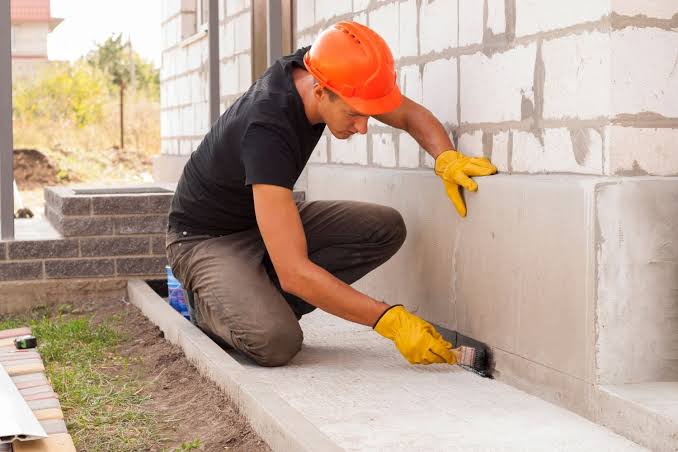
Rebuilding Foundation Wall: Exploring the True Costs
Discover the hidden costs involved in rebuilding foundation walls and make an informed decision. Explore the true expense!
Understanding the Importance of a Solid Foundation: Exploring the True Costs of Rebuilding Foundation Wall
A strong and stable foundation is the backbone of any structure. It provides support and stability, ensuring that the building stands strong against the test of time. However, over the years, foundation walls can deteriorate due to various factors such as soil movement, water damage, or structural issues. In such cases, rebuilding the foundation wall becomes necessary to maintain the structural integrity of the building.
When it comes to rebuilding a foundation wall, one of the primary concerns for homeowners is the cost involved. Rebuilding foundation wall is a significant investment, and it is essential to understand the true costs associated with this undertaking. By exploring the factors that determine the cost and understanding the importance of a solid foundation, homeowners can make informed decisions and budget accordingly.
Assessing and Planning for a Stronger Basement: The Cost Considerations when Rebuilding your Foundation Wall
Before diving into the financial aspect of rebuilding a foundation wall, it is crucial to assess the condition of the existing wall and plan for a stronger basement. A professional inspection by a structural engineer or a foundation specialist is recommended to evaluate the extent of the damage and determine the necessary repairs.
The cost to rebuild basement wall can vary significantly depending on factors such as the size of the wall, the type of materials used, and the complexity of the project. Typically, the cost is calculated per square foot of the wall. On average, homeowners can expect to spend anywhere between $7,000 to $30,000 for a complete foundation wall rebuild.
It is important to note that the cost to rebuild basement wall is not limited to just the construction itself. There are several other cost considerations that homeowners need to keep in mind, including permits, labor, equipment rentals, and any additional repairs that may be required.
Breaking Down the Expenses: Calculating the True Costs of Rebuilding Your Basement’s Foundation Wall
To get a better understanding of the true costs involved in rebuilding a basement’s foundation wall, let’s break down the expenses:
Materials: The type of materials used for the foundation wall can have a significant impact on the overall cost. Concrete blocks, poured concrete, or stone are commonly used materials. The cost of materials will depend on the chosen option and the quantity required.
Labor: Hiring professionals to rebuild the foundation wall is crucial for ensuring the job is done right. The labor cost will depend on factors such as the complexity of the project, the number of workers required, and the duration of the project.
Permits: Depending on local regulations, obtaining permits for foundation work may be necessary. Permit fees can vary, so it is important to check with the local building department for specific requirements and associated costs.
Equipment Rentals: Specialized equipment may be required for excavating and rebuilding the foundation wall. The rental cost of equipment such as excavators, concrete mixers, and scaffolding should be factored into the overall expenses.
Additional Repairs: During the rebuilding process, it is not uncommon to discover other issues that need attention, such as drainage problems or damaged plumbing. These additional repairs will add to the overall cost of the project.
By considering these factors and estimating the costs associated with each, homeowners can create a more accurate budget for their foundation wall rebuild project.
The Factors Impacting the Price Tag:
Exploring What Determines the Cost to Rebuild a Foundation Wall
Several factors influence the cost of rebuilding a foundation wall. Understanding these factors can help homeowners anticipate the price tag and plan accordingly. Here are some of the key determinants:
Foundation Wall Material: The choice of material for the foundation wall is a significant factor affecting the cost. Concrete blocks are generally more affordable than poured concrete or stone. However, each material has its own advantages and disadvantages, and homeowners should consider the long-term durability and maintenance requirements when making a decision.
Foundation Wall Size and Height: The size and height of the foundation wall directly impact the cost. Larger walls require more materials and labor, increasing the overall expense. Additionally, taller walls may require additional reinforcement and engineering considerations, adding to the cost.
Accessibility: The accessibility of the construction site can affect the cost of rebuilding the foundation wall. If the site is challenging to access, it may require specialized equipment or additional labor, increasing the overall expense.
Site Conditions: The condition of the site where the foundation wall is located can also impact the cost. If the soil is unstable or there are existing drainage issues, additional measures may be required to ensure the stability of the new foundation wall.
Geographic Location: The geographic location of the property can also play a role in determining the cost. Labor and material costs can vary depending on the region, so it is essential to consider the local market rates when estimating the expenses.
By considering these factors and discussing them with a professional contractor, homeowners can get a better understanding of the cost to rebuild their foundation wall.
Budgeting for Success: How to Estimate and Plan for Rebuilding Your Basement’s Foundation Wall
Estimating and planning for the cost of rebuilding a basement’s foundation wall is crucial to ensure a successful project without any financial surprises. Here are some steps to help homeowners budget effectively:
Research and Gather Quotes: Start by researching local contractors and requesting quotes for the project. It is recommended to obtain multiple quotes to compare prices and services. Be sure to provide accurate information about the project scope to receive accurate estimates.
Consider Additional Costs: In addition to the construction expenses, consider other costs such as permits, equipment rentals, and any necessary repairs. These additional expenses can significantly impact the overall budget.
Set a Realistic Budget: Based on the gathered quotes and additional cost considerations, set a realistic budget for the foundation wall rebuild project. It is advisable to allocate a contingency fund of around 10% of the total budget to account for any unforeseen expenses.
Explore Financing Options: If the cost of rebuilding the foundation wall exceeds the available budget, homeowners may need to explore financing options such as home improvement loans or lines of credit. Consulting with a financial advisor can help determine the best financing solution for individual circumstances.
Prioritize Quality Workmanship: While it may be tempting to choose the lowest-priced contractor, it is crucial to prioritize quality workmanship. A poorly executed foundation wall rebuild can lead to further issues down the line, costing more in the long run. Choose a reputable contractor with a track record of delivering high-quality results.
By following these steps and being proactive in budgeting, homeowners can ensure a smoother rebuilding process and minimize financial stress.
Finding Value in Quality Workmanship: Investing Wisely in Repairing Your Home’s Foundation Wall
When it comes to rebuilding a foundation wall, quality workmanship should be a top priority. Investing in a reputable contractor who has experience in foundation wall repairs can make a significant difference in the long-term durability and stability of the structure.
A professionally rebuilt foundation wall not only ensures the safety of the occupants but also adds value to the property. Potential buyers are more likely to be attracted to a home with a solid foundation, as it provides peace of mind and reduces the risk of future costly repairs.
When selecting a contractor, consider factors such as their experience, credentials, and customer reviews. Request references and visit past project sites if possible. It is also advisable to ask about warranty options to provide additional protection for the investment.
By investing wisely in repairing the home’s foundation wall, homeowners can reap the benefits of a structurally sound property and potentially increase its market value.
Uncovering Hidden Expenses: Understanding Additional Costs Associated with Rebuilding Your Basement’s Foundation
In addition to the direct expenses involved in rebuilding a basement’s foundation wall, there are often hidden costs that homeowners should be aware of. These additional costs can arise during the construction process or as a result of the rebuild. Here are some common hidden expenses to consider:
Temporary Housing: Depending on the extent of the foundation wall rebuild, homeowners may need to temporarily relocate during the construction period. The cost of temporary housing, such as renting an apartment or staying in a hotel, should be factored into the overall expenses.
Landscaping Restoration: Rebuilding the foundation wall may require excavation and disturbance of the surrounding landscape. Restoring the landscaping after the project is complete can add to the overall cost. Consider the cost of reseeding or replanting, as well as any necessary hardscaping repairs.
Interior Repairs: In some cases, the rebuilding process may cause damage to the interior of the basement or other parts of the house. Repairing any interior damage, such as drywall, flooring, or electrical work, should be accounted for in the budget.
Extended Project Timeline: Unforeseen challenges or complications can arise during the foundation wall rebuild, leading to an extended project timeline. This can result in additional costs, such as increased labor expenses or the need for temporary structural support.
By considering these hidden expenses and allocating a contingency fund in the budget, homeowners can better prepare for the true costs associated with rebuilding their basement’s foundation wall.
Beyond Financial Considerations: Exploring Benefits and Long-Term Savings of Repairing Your Home’s Foundation
While the financial aspect is a significant consideration when rebuilding a foundation wall, it is important to also explore the benefits and long-term savings associated with this investment.
Structural Integrity: A strong and stable foundation wall ensures the structural integrity of the entire building. By investing in a rebuild, homeowners can have peace of mind knowing that their property is built on a solid foundation, reducing the risk of future structural issues.
Improved Energy Efficiency: A properly rebuilt foundation wall can enhance the energy efficiency of the home. By sealing any cracks or gaps, it prevents air leakage and heat loss, resulting in lower energy bills and a more comfortable living environment.
Prevention of Further Damage: Ignoring a deteriorating foundation wall can lead to more significant structural issues in the future. By addressing the problem early on and rebuilding the wall, homeowners can prevent costly repairs down the line.
Increased Property Value: A professionally rebuilt foundation wall adds value to the property. Potential buyers are more likely to be attracted to a home with a solid foundation, making it easier to sell in the future and potentially commanding a higher sale price.
By considering these benefits and long-term savings, homeowners can make an informed decision about rebuilding their basement’s foundation wall, knowing that it is not just an expense but a valuable investment in their property.
In conclusion, rebuilding a foundation wall is a significant undertaking that requires careful planning and budgeting. By understanding the true costs associated with this project, homeowners can make informed decisions and ensure the long-term stability and value of their property. By investing in quality workmanship and considering the hidden expenses, homeowners can avoid financial surprises and reap the benefits of a structurally sound home.
Download Now

